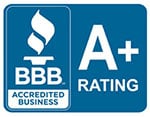What Makes Siding Weatherproof?
Shop around for siding, and you’re sure to see the word “Weatherproof” featured prominently. This might seem a bit perplexing at first, since all siding is theoretically supposed to protect your home from the elements. Let’s take a closer look at what’s behind the term “Weatherproof.”

Protective coats prevent the elements from making it through weatherproof siding panels.
Exterior Protection
Since siding goes on the outside of your home, it serves as the first line of defense against the elements. In Houston, that means the outside-facing parts of siding must repel rain and salt spray, while standing up to heat and humidity.
Certain materials stand up to the elements better than others. For example, moisture can seep through wood more easily than fiber cement. Still, there are ways to seal the outside of even permeable siding. These include finishes paints and seals.
Many siding providers will test their products against extreme elements to make sure that they stand up to whatever Mother Nature throws at them. These tests can help prove that siding can stand up to extreme UV light, freezing temperatures, water immersion, salt spray and humidity.
Between The Panel Protection
Of course, it’s also important to keep the elements from invading your home between portions of siding. This can be a serious issue when changing weather conditions cause panels to expand or contract, even slightly. Tongue and groove installation for siding panels can help alleviate this problem. Strong seals can also help keep much of these elements from sneaking into your home.
Although seals connect segments of siding, they also tend to have a portion that faces outward. Because of this, the seal must be able to handle the same extreme weather conditions that the siding surrounding it does. While moisture protection is not often a concern, some seal materials could crack under extreme temperature changes or exposure to the sun. These seals shouldn’t be applied to the exterior of your home.

Weatherproof insulation protects homes from any moisture that might seep through the exterior layers of siding.
Weatherproof Insulation
Many homes feature a layer of insulation between the outer and inner walls. This insulating layer serves as a buffer between the climate-controlled interior of a home and the climate outside. Insulation is extremely important during the brutal summer heat in Houston, as it can keep your home comfortable.
While insulation doesn’t face the elements directly, it can be used to help reinforce the walls of your home against the weather outside of them. Several siding manufacturers make insulating wraps that are designed specifically to keep out moisture that can make it through a layer of siding. These wraps also release water vapor from the inside of a home, which prevents that moisture from collecting in the wall cavities and causing serious damage.
Weatherproof insulation wraps such as HardieWrap® Weather Barrier by James Hardie® are incredibly important in Houston homes, since high humidity is so prevalent across the area. It’s important to keep water vapor and sea salt from making it into homes in such a moist environment, and weatherproof insulation can serve as another line of defense.
Is Weatherproof Siding Necessary in Houston?
Absolutely. While Southeast Texas doesn’t see the same weather extremes as the upper Great Plains, or even North Texas, high humidity can really tax the exterior of your home. Since the Gulf of Mexico is not far away from Houston, Gulf vapor and salt spray can infiltrate the air and lay siege on anything in its path.
If the water vapor in the often-muggy Houston climate can seep through your siding and into your walls, it gradually cause water damage in the wall cavity —which is really hard to get to for repairs. Mold can also form in those areas, which brings even more problems.
Best Investments Siding and Windows features many types of siding —including James Hardie products — that can help keep your home protected. For a free quote, click here or call (281) 852-1866.




Recent Comments